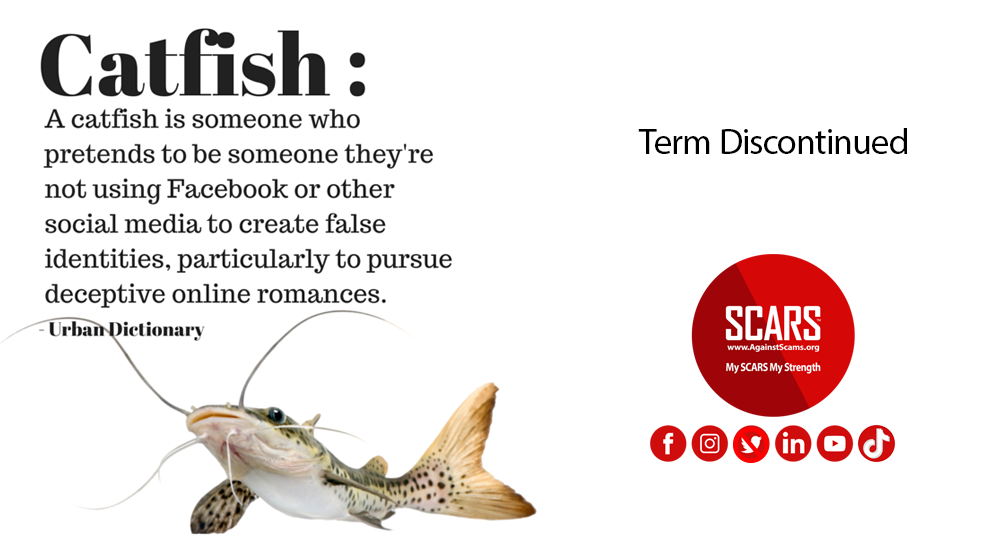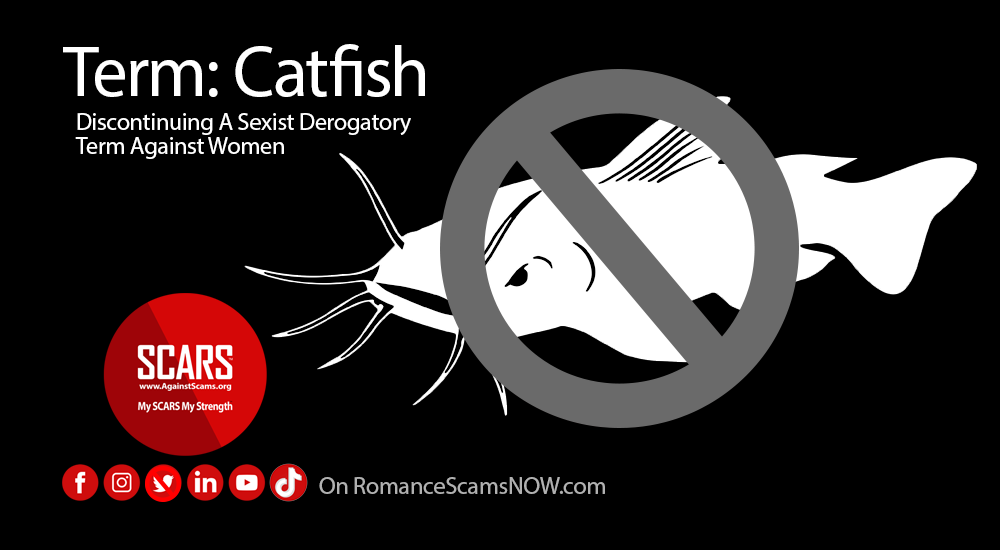
SCARS Institute’s Encyclopedia of Scams™ Published Continuously for 25 Years

The Term “CATFISH” – Is An Insult To Romance Scams Victims
It Is Actually A Derogatory Term Against Women
We have often been asked why we do not use the term Catfish?
The term “Catfish” is an insult to the victims of this crime!
It makes it sound cute and clever.
It is psychological TORTURE!
There are many times when political correctness goes too far. But at other times it makes us think about what we say and the terms we use.
Think for a moment about the genesis of words
Catfishing, as it is commonly used, is a decriptive term for an activity where a person creates a fictional persona or fake identity on a social networking service, usually targeting a specific kind of victim. The practice may be used for financial gain, to compromise a victim in some way, as a way to intentionally upset a victim, or for wish-fulfillment (as it was originally coined). Catfishing media has been produced, often featuring victims who wish to identify their catfisher. Celebrities have been targeted, which has brought media attention to catfishing practices. There is even a terrible exploiting TV series by that name.
According to Wikipedia, the origin of the term ‘Catfishing,’ a slang term for creating fake profiles on social media to create false identities, has its origins (according to them) in the 2010 movie ‘Catfish,’ a pseudo-documentary that chronicled a young man’s online friendship with a woman that turned out to be very different from her Facebook profile.
While this confirms a male origination and that women catfish men, we believe the term goes back to the early 2000s.
According to dating industry insiders, the term originated around 2000 as a derogatory term for women that altered their attributes on dating websites such as Match, and other sites. It used “cat” as a slang term for women who were fishing for mates or partners by falsifying their information or using photos stolen from other people. This also relates to the fact that real catfish are far from attractive fish. It ignored the fact that men also do exactly the same thing, so there is no exclusivity on the gender of fakes online.
Thus overall, it seems to have originated in a deliberately derogatory, sexist or gender-specific, and even body shaming desire to condemn the women that engaged in this practice.
Another oblique reference to the term comes from the parable of the catfish that has been given a less world-historical slant by American Christians. Pastor Charles Swindoll used it in his 1988 book Come Before Winter and Share My Hope to offer personal spiritual guidance. “Each one of us is in a tank of particular and inescapable circumstances,” Swindoll writes. “It is painful enough to stay in the tank. But in addition to our situation, there are God-appointed ‘catfish’ to bring sufficient tension that keeps us alive, alert, fresh, and growing.” Swindoll’s version has been widely disseminated since then, perhaps most notably appearing in a 2007 book by the influential pastor Joel Osteen. An assistant to Swindoll told Slate that he first encountered the story in a 1983 article in the now out-of-print Fullness Magazine. Ths the catfish are sent to test us?
All in all, SCARS feels that the term is a derogatory term and has no place in the rational discussions of cyber-enabled crime because of its probable sexist origin and because of its imprecise-cliched overuse. It is for that reason that we have stopped using it and have banned it from our future publications.
Unfortunately, because it is a common term, we are forced to use it in certain contexts, bother for search SEO purposes, and to help victims better understand these scams. You will still see some articles on our site with that term, but we will remove them as we revise our articles over time.
For those that continue to use it prominently and provide evidence of their lack of sensitivity and generally amateurish approach to these serious problems, we suggest that they rethink their use of terms.
We believe that the important issue is that we all take a look at the terms we use and do a better job of understanding their impact on others.

More Words We Prefer Not To Use:
-
bamboozled
-
deluded
-
duped
-
hornswoggled
-
outfoxed
-
snowed
-
beguiled
-
bilked
-
burned
-
duped
-
finessed
-
gypped
-
hoodwinked
-
swindled
-
tricked
-
ripped off
-
taken in
-
caught
-
chicaned
-
circumvented
-
cozened
-
dusted
-
flimflammed
-
gulled
-
hoaxed
-
kidded
-
outwitted
-
rooked
-
shafted
-
spoofed
-
double-crossed
-
jerked around
-
pull something
-
roped in
-
yanked
-
done a number on
-
done out of
-
catfished
-
dogfished
-
pulled fast one
-
suckered into
-
taken in
-
taken to the cleaner’s
- crossed
- schemed
- a racket
- thimblerig
- montied
- deviced
- dodged
- gimmicked
- jigged
- ployed
- slighted
- out strategized
- tricked
- wiled
- gouged
- soaked or had a soaking
- hoaxed
- humbugged
- shammed
Each of these describes a scam, but each of them also has a connotation of foolishness or carelessness or blame built into their use. They also tend to make light of the criminal act they represent.
When we use slang and euphemisms it diminishes the real impact on victims. These crimes are serious. There is nothing funny about them. They are life-changing.
It is important to think about this when we describe what has been done so that others do not mistake a slang term to indicate it does not matter or that there was no pain.
The same is true in every language. Think about the terms you use and make sure you communicate precisely about scams!
TAGS: SCARS, Information About Scams, Romance Scams, Scam Victims, Fake People, Online Fraud, Fake Profiles, Online Crime Is Real Crime, Scam Avoidance, People Who Deceive Online, Catfish, Catfished, Derogatory Terms, Insulting To Victims
PLEASE SHARE OUR ARTICLES WITH YOUR FRIENDS & FAMILY
HELP OTHERS STAY SAFE ONLINE – YOUR KNOWLEDGE CAN MAKE THE DIFFERENCE!
THE NEXT VICTIM MIGHT BE YOUR OWN FAMILY MEMBER OR BEST FRIEND!
By the SCARS™ Editorial Team
Society of Citizens Against Relationship Scams Inc.
A Worldwide Crime Victims Assistance & Crime Prevention Nonprofit Organization Headquartered In Miami Florida USA & Monterrey NL Mexico, with Partners In More Than 60 Countries
To Learn More, Volunteer, or Donate Visit: www.AgainstScams.org
Contact Us: Contact@AgainstScams.org
-/ 30 /-
What do you think about this?
Please share your thoughts in a comment below!
Table of Contents
- It Is Actually A Derogatory Term Against Women
- The term “Catfish” is an insult to the victims of this crime!
It makes it sound cute and clever.
It is psychological TORTURE! - Think for a moment about the genesis of words
- We believe that the important issue is that we all take a look at the terms we use and do a better job of understanding their impact on others.
- PLEASE SHARE OUR ARTICLES WITH YOUR FRIENDS & FAMILY
- By the SCARS™ Editorial Team
Society of Citizens Against Relationship Scams Inc. - The Issue Of Race In Scam Reporting
Click Here To Learn More!
LEAVE A COMMENT?
Recent Comments
On Other Articles
- Arwyn Lautenschlager on Love Bombing And How Romance Scam Victims Are Forced To Feel: “I was love bombed to the point that I would do just about anything for the scammer(s). I was told…” Feb 11, 14:24
- on Dani Daniels (Kira Lee Orsag): Another Scammer’s Favorite: “You provide a valuable service! I wish more people knew about it!” Feb 10, 15:05
- on Danielle Delaunay/Danielle Genevieve – Stolen Identity/Stolen Photos – Impersonation Victim UPDATED 2024: “We highly recommend that you simply turn away form the scam and scammers, and focus on the development of a…” Feb 4, 19:47
- on The Art Of Deception: The Fundamental Principals Of Successful Deceptions – 2024: “I experienced many of the deceptive tactics that romance scammers use. I was told various stories of hardship and why…” Feb 4, 15:27
- on Danielle Delaunay/Danielle Genevieve – Stolen Identity/Stolen Photos – Impersonation Victim UPDATED 2024: “Yes, I’m in that exact situation also. “Danielle” has seriously scammed me for 3 years now. “She” (he) doesn’t know…” Feb 4, 14:58
- on An Essay on Justice and Money Recovery – 2026: “you are so right I accidentally clicked on online justice I signed an agreement for 12k upfront but cd only…” Feb 3, 08:16
- on The SCARS Institute Top 50 Celebrity Impersonation Scams – 2025: “Quora has had visits from scammers pretending to be Keanu Reeves and Paul McCartney in 2025 and 2026.” Jan 27, 17:45
- on Scam Victims Should Limit Their Exposure To Scam News & Scammer Photos: “I used to look at scammers photos all the time; however, I don’t feel the need to do it anymore.…” Jan 26, 23:19
- on After A Scam, No One Can Tell You How You Will React: “This article was very informative, my scams happened 5 years ago; however, l do remember several of those emotions and/or…” Jan 23, 17:17
- on Situational Awareness and How Trauma Makes Scam Victims Less Safe – 2024: “I need to be more observant and I am practicing situational awareness. I’m saving this article to remind me of…” Jan 21, 22:55
ARTICLE META
Important Information for New Scam Victims
- Please visit www.ScamVictimsSupport.org – a SCARS Website for New Scam Victims & Sextortion Victims
- Enroll in FREE SCARS Scam Survivor’s School now at www.SCARSeducation.org
- Please visit www.ScamPsychology.org – to more fully understand the psychological concepts involved in scams and scam victim recovery
If you are looking for local trauma counselors please visit counseling.AgainstScams.org or join SCARS for our counseling/therapy benefit: membership.AgainstScams.org
If you need to speak with someone now, you can dial 988 or find phone numbers for crisis hotlines all around the world here: www.opencounseling.com/suicide-hotlines
A Note About Labeling!
We often use the term ‘scam victim’ in our articles, but this is a convenience to help those searching for information in search engines like Google. It is just a convenience and has no deeper meaning. If you have come through such an experience, YOU are a Survivor! It was not your fault. You are not alone! Axios!
A Question of Trust
At the SCARS Institute, we invite you to do your own research on the topics we speak about and publish, Our team investigates the subject being discussed, especially when it comes to understanding the scam victims-survivors experience. You can do Google searches but in many cases, you will have to wade through scientific papers and studies. However, remember that biases and perspectives matter and influence the outcome. Regardless, we encourage you to explore these topics as thoroughly as you can for your own awareness.
Statement About Victim Blaming
SCARS Institute articles examine different aspects of the scam victim experience, as well as those who may have been secondary victims. This work focuses on understanding victimization through the science of victimology, including common psychological and behavioral responses. The purpose is to help victims and survivors understand why these crimes occurred, reduce shame and self-blame, strengthen recovery programs and victim opportunities, and lower the risk of future victimization.
At times, these discussions may sound uncomfortable, overwhelming, or may be mistaken for blame. They are not. Scam victims are never blamed. Our goal is to explain the mechanisms of deception and the human responses that scammers exploit, and the processes that occur after the scam ends, so victims can better understand what happened to them and why it felt convincing at the time, and what the path looks like going forward.
Articles that address the psychology, neurology, physiology, and other characteristics of scams and the victim experience recognize that all people share cognitive and emotional traits that can be manipulated under the right conditions. These characteristics are not flaws. They are normal human functions that criminals deliberately exploit. Victims typically have little awareness of these mechanisms while a scam is unfolding and a very limited ability to control them. Awareness often comes only after the harm has occurred.
By explaining these processes, these articles help victims make sense of their experiences, understand common post-scam reactions, and identify ways to protect themselves moving forward. This knowledge supports recovery by replacing confusion and self-blame with clarity, context, and self-compassion.
Additional educational material on these topics is available at ScamPsychology.org – ScamsNOW.com and other SCARS Institute websites.
Psychology Disclaimer:
All articles about psychology and the human brain on this website are for information & education only
The information provided in this article is intended for educational and self-help purposes only and should not be construed as a substitute for professional therapy or counseling.
While any self-help techniques outlined herein may be beneficial for scam victims seeking to recover from their experience and move towards recovery, it is important to consult with a qualified mental health professional before initiating any course of action. Each individual’s experience and needs are unique, and what works for one person may not be suitable for another.
Additionally, any approach may not be appropriate for individuals with certain pre-existing mental health conditions or trauma histories. It is advisable to seek guidance from a licensed therapist or counselor who can provide personalized support, guidance, and treatment tailored to your specific needs.
If you are experiencing significant distress or emotional difficulties related to a scam or other traumatic event, please consult your doctor or mental health provider for appropriate care and support.
Also read our SCARS Institute Statement about Professional Care for Scam Victims – click here to go to our ScamsNOW.com website.

















Thank you for your comment. You may receive an email to follow up. We never share your data with marketers.